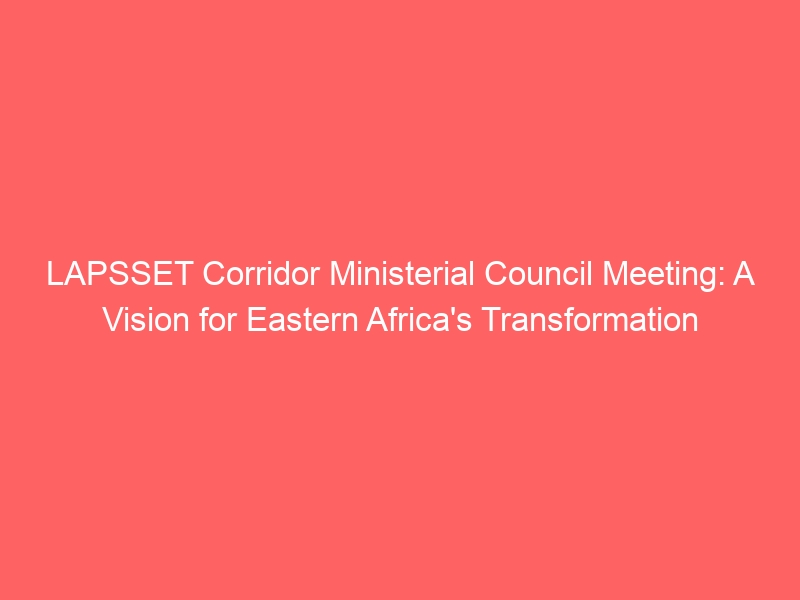By Baboloki Semele: The vibrant coastal town of Lamu recently played host to a significant gathering of leaders and stakeholders as the Economic Commission for Africa (ECA), in collaboration with the government of Kenya, convened the fourth Ministerial Council meeting of the LAPSSET Corridor program. Held on August 21-22, 2024, the meeting brought together government officials, representatives from Ethiopia, Kenya, and South Sudan, development partners, and business leaders under the theme: “Unleashing Potential: The LAPSSET Corridor as a Catalyst for Sustainable Development, Seamless Connectivity, Regional Integration, and Trade.”
According to a press statement from United Nations Economic Commission for Africa (ECA), the LAPSSET Corridor program, a bold initiative aimed at enhancing trade and cultural exchange across Eastern Africa, has positioned Lamu as a critical hub in the region’s infrastructure network. The Joint Technical Committee (JTC) announced its plans to finalize a regional coordination mechanism by September, aimed at maximizing the benefits of the corridor for partner states.
Lamu Governor Isati Mame extended a warm welcome to the assembled dignitaries and stakeholders, emphasizing the transformative potential of the LAPSSET Corridor. He lauded the project as a visionary endeavor that could reshape the economic and social landscape of Eastern Africa. Governor Mame highlighted the importance of inclusive and sustainable development, underscoring the need for environmental protection, community rights, and equitable growth as central tenets of the corridor’s development.
Speaking on behalf of the Executive Secretary of the ECA, Stephen Karingi, Director of Regional Integration and Trade, reiterated the Commission’s commitment to working closely with national and regional partners to fully realize the LAPSSET Corridor’s benefits. He emphasized that the program is essential for achieving a connected Africa, particularly for landlocked developing countries, and has already made significant strides in advancing the continent.
During the discussions, Ethiopian Maritime Authority Deputy Director Temesgen Yihunie Alamineh shed light on the challenges faced by the transport and logistics sector in the region. He stressed the importance of self-sufficiency and efficient logistics to streamline import and export processes. Alamineh also highlighted the critical need for road connectivity from Lamu to Ethiopia and called for harmonizing access load issues and regulatory frameworks.
South Sudan’s Minister of Transport, Madut Biar Yel, provided an overview of the significant investments his country has made in the LAPSSET Corridor. He highlighted key projects, including the Lamu Port, the Moyali-Hawasha Road in Kenya, and the Nadapal-Turkana Road in South Sudan. Minister Yel also discussed progress in resolving border issues with Kenya and outlined plans for future collaboration on the Nadapal-Juba Road. Additionally, he pointed to upcoming ventures in mineral exploration, oil and gas development, and the expansion of airports, railways, and waterways.
Kenya’s newly appointed Cabinet Secretary of the Ministry of Transport and Logistics, Davis Chirchir, praised the achievements of the Kenya Ports Authority, particularly the completion and operationalization of the first three berths at Lamu Port. He also highlighted ongoing projects within the LAPSSET Corridor, including a hydroelectric dam, electric supply initiatives, agricultural programs, and broadband connectivity efforts aimed at improving services across Africa.
The meeting recognized Governor Isati Mame’s expanded role, now also serving as Governor for South Sudan and Ethiopia, and commended his dedication to the development of the corridor. The gathering underscored the urgency of accelerating the region’s and continent’s potential by enhancing connectivity, facilitating trade, and improving the movement of people.
As the meeting concluded, participants looked forward to the next Ministerial Council meeting, scheduled to be hosted by Ethiopia, where further progress on the LAPSSET Corridor’s ambitious goals will be reviewed.
The LAPSSET Corridor continues to stand as a testament to Eastern Africa’s drive toward sustainable development and regional integration, promising to unlock new opportunities for economic growth and cultural exchange in the years to come.
